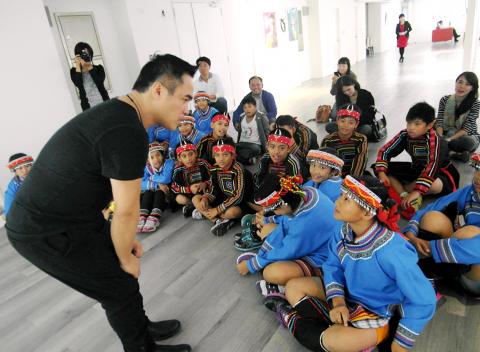Yosifu, a fine arts painter and Amis Aborigine, has just completed an art workshop for some of Taitung’s Aboriginal youth.
“I came back [to Taiwan] and did it because I wanted to give back to my people and help other indigenous artists develop,” he told the Taipei Times.
Yosifu, who lives in Edinburgh, promotes Taiwan’s indigenous culture throughout Europe.

Photo courtesy of the Taiwan Cultural & Creative Platform Foundation
As one of the first Taiwanese Aborigines to achieve international artistic success and recognition, he typifies the need for involvement at the grassroots level.
The Council of Indigenous Peoples and government agencies can set policies and hold conferences such as the recent 2013 International Austronesian Conference, but the level, extent and degree to which policies and actions are carried out often depends more on people at the grassroots level. Fortunately, in Taiwan that level is increasing.
There’s no one event or phenomenon that triggered this recent grassroots surge of involvement, though the increased use and ability of Facebook, YouTube and other social media may be a factor. In addition, art is a common denominator in many of the new grassroots projects.
Elise Tseng (曾珮貞) left a career in the art industry in 2011 to take charge of the Taiwan Cultural & Creative Platform Foundation.
“I saw that despite Taiwan having many artists, [art] had not yet touched and explored its basic base, namely its indigenous people,” Tseng said.
Her foundation sponsors workshops such as the one held by Yosifu. After researching Australian models of promoting indigenous culture, Tseng and the foundation used them to organize art and festivals.
“We strive to show [Aborigines the] environment of the urban city that they will face as artists and [encourage them] to dream big.” Dream Big is in fact the title of one of their projects.
A different unique story is that of American Tony Coolidge, who discovered his Atayal heritage when living in the US. This led to his involvement with indigenous peoples and the founding of Atayal, a nonprofit organization that tries to bring together indigenous cultures from around the world. His award-winning film Voices in the Clouds premiered in 2010.
“It was my personal roots trip back to my heritage,” Coolidge said.
Earlier this month, Coolidge spearheaded a project called Tap Root, a Journey of Self-Discovery, in which Maori film students from New Zealand toured Taiwan and shared their Austronesian culture and experiences. This is not without some irony since they arrived during the 2013 International Austronesian Conference but were not acknowledged by it.
Kolas Yotaka, a producer and presenter at Taiwan Indigenous TV, says that art is not the only platform for involvement. Some groups focus on political issues — Yotaka named the Taiwan Indigenous Tribal Movement League (台灣部落行動聯盟) led by Omi Wilang of the Taiwan Presbyterian Church, and the Smoke Signals League.
“But even with the political, art can take a supportive role,” Yotaka said.
Art and culture certainly seem to be the vehicle that allows all to get involved.
Minna Hsu (徐敏娜), a Taiwanese American working on a Ph.D in Human Geography at Macquarie University in Sydney, Australia, decided to join the newly formed Austronesian Cultural and Economic Cooperative Association because she believes that it is important to “promote awareness of and cooperation between the indigenous cultures of Taiwan and abroad.”
Taiwan’s expat community is also finding art to be a less threatening environment for involvement. Jonathan Burke, a director in the customer service field, is a permanent resident in Taiwan who has long been involved in volunteer work.
“It is an expression of my Christian faith to assist and help socially marginalized groups.”
In 2011, he started participating in photography workshops that help Aboriginal youth expand their artistic expression.
Yosifu says government assistance is important, but that the grassroots may be where it’s at, and that art is proving to be the medium.
“I came to find a sense of pride and acceptance in Europe first by trying modern art. Success there led me to realize I should also be proud of my indigenous heritage and incorporate that into my art. I even took back my tribal name, Yosifu. Now I return regularly to help others,” he said.

That US assistance was a model for Taiwan’s spectacular development success was early recognized by policymakers and analysts. In a report to the US Congress for the fiscal year 1962, former President John F. Kennedy noted Taiwan’s “rapid economic growth,” was “producing a substantial net gain in living.” Kennedy had a stake in Taiwan’s achievements and the US’ official development assistance (ODA) in general: In September 1961, his entreaty to make the 1960s a “decade of development,” and an accompanying proposal for dedicated legislation to this end, had been formalized by congressional passage of the Foreign Assistance Act. Two

Despite the intense sunshine, we were hardly breaking a sweat as we cruised along the flat, dedicated bike lane, well protected from the heat by a canopy of trees. The electric assist on the bikes likely made a difference, too. Far removed from the bustle and noise of the Taichung traffic, we admired the serene rural scenery, making our way over rivers, alongside rice paddies and through pear orchards. Our route for the day covered two bike paths that connect in Fengyuan District (豐原) and are best done together. The Hou-Feng Bike Path (后豐鐵馬道) runs southward from Houli District (后里) while the

President William Lai’s (賴清德) March 13 national security speech marked a turning point. He signaled that the government was finally getting serious about a whole-of-society approach to defending the nation. The presidential office summarized his speech succinctly: “President Lai introduced 17 major strategies to respond to five major national security and united front threats Taiwan now faces: China’s threat to national sovereignty, its threats from infiltration and espionage activities targeting Taiwan’s military, its threats aimed at obscuring the national identity of the people of Taiwan, its threats from united front infiltration into Taiwanese society through cross-strait exchanges, and its threats from

March 31 to April 6 On May 13, 1950, National Taiwan University Hospital otolaryngologist Su You-peng (蘇友鵬) was summoned to the director’s office. He thought someone had complained about him practicing the violin at night, but when he entered the room, he knew something was terribly wrong. He saw several burly men who appeared to be government secret agents, and three other resident doctors: internist Hsu Chiang (許強), dermatologist Hu Pao-chen (胡寶珍) and ophthalmologist Hu Hsin-lin (胡鑫麟). They were handcuffed, herded onto two jeeps and taken to the Secrecy Bureau (保密局) for questioning. Su was still in his doctor’s robes at